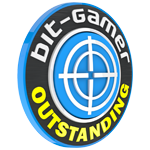
In combat, you're kind of sharp, too. Weapons break with a nearly alarming regularity, but you can disarm your enemies and take their sticks and clubs if you're at a loss. The enemies are interesting, with early ones starring as bizarre goblin-looking scumbags that you can give a quick battering without too many problems. Before long you'll be fighting skeletons — which can be knocked apart in one hit, but you'll need to destroy the head or punt it into a lake to stop them for good — and all sorts of other beasties. I think the weapon durability is a touch on the weak side, and as soon as you get sword you love it'll probably break. I found inner peace with this, though, as soon as I realised you're supposed to be changing weapons in nearly every fight, using a burning club to scare off goblins or an electric sword to get a giant ogre to drop his club so you can have a go.
It's probably one of my favourite combat systems in recent memory, and when you get it right, you feel like a superhero. It lacks some of the tightness of a focused melee combat title, and for the first few hours pretty much everything you fight can fell you with a single blow, but you'll pick up the skills fast.
The penalty for all of this complexity is slight but noticeable. There's a brief adjustment period as you get used to Zelda's many systems that'll take a bit of work to get used too, and some of these mechanics just break up the flow. Rain is the biggest culprit here, with wet surfaces being nearly impossible to climb and putting out fires, which need to be lit for you to sit next to them and speed up time so that you can fast-forward to a time without rain on everything. Get it?
You might also struggle with the controls, a problem that's half Zelda and half the Nintendo Switch. I struggled with, but got used to, the Nintendo Switch's Joy-Cons in the grip configuration, but Zelda's button configurations make no sense, and for the first 15 hours of so I clutched clumsily at my controller as I accidentally dropped bombs and tossed swords in combat, to ill effect.
Technically, it's also a little way off flawless. This is okay, the Switch it's running on is basically a glorified tablet, but you'll see the very occasional bit of slowdown — often when fire is propagating, or a lot of particle effects are flying around — and there's pop-in if you're travelling at high speeds, which doesn't really happen that much.
These are minor annoyances to an otherwise nearly flawless game, and I say this without hyperbole because, and I want you to take me at my word here: The Legend of Zelda: Breath of the Wild is the most technically proficient and mechanically engaging open-world game I've ever played. It's an all-time classic for me, shouldering its way into my top-ten games of all time. The way that it has all of this magic tucked away and then lazily unfurls it to show you the goods as you meander around it means that if you give it a chance, it will worm its way into your head and not let go.
The big unspoken question around Breath of the Wild right now isn't whether it's a good game: because it is. It's not even whether it's worth £40: because it is, undoubtedly. The real problem for the game is the £300 millstone around its neck.
I'll just go out there and say it. Is The Legend of Zelda: Breath of the Wild worth the £300 it'd cost to get a Nintendo Switch to pay it on? My belief is adamant that it is. I'm at nearly 70 hours played so far, and every single one of them has been nothing but rapturous delight.


MSI MPG Velox 100R Chassis Review
October 14 2021 | 15:04














Want to comment? Please log in.